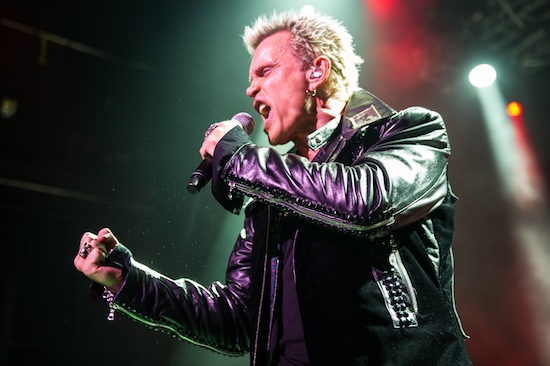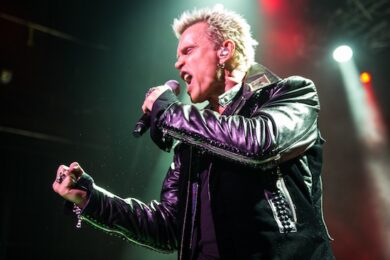I have two favourite Billy Idol stories, and neither of them is the one you’ve heard a million times on talking-head documentaries about Generation X pissing on the heads of the public from the roof of Broadcasting House cos they’d been overdoing it at the BBC hospitality bar.
My first-favourite Billy Idol story doesn’t feature in Dancing With Myself, his eye-poppingly candid autobiography, but it does appear in Nile Rodgers’ even more startling Le Freak. At some point in 1982, Rodgers and Idol were sinking a drink or ten in the Continental bar in Manhattan when they spotted a famous face in the shadows, minding his own business. “Fuckin’ ‘ell,” blurted Billy, “It’s David Booooowiiiieeeee!” A booze-emboldened Idol, with a more reticent Rodgers in tow, strode across the room, but halfway there, Idol’s peristalsis went into reverse and he vomited all over himself. Pausing only to wipe his mouth on his sleeve, he cheerfully shook the Dame’s hand.
My second-favourite Billy Idol story does make it into Dancing With Myself. After a gig in San Francisco, he invited a girl back to his hotel, who insisted he put his entire fist inside her. Idol, ever the gentleman, naturally obliged. This act sent his guest into such spasms of ecstasy that her muscles began to clamp closed, and he couldn’t get his hand back out again, forcing him to crawl around the room with her wherever she went. When Idol finally managed to extricate his fist, it had swollen to twice its normal size, and he needed to sleep with it dangling in an ice bucket to bring it back to normality.
What I love about both those stories is that they feed into our folk memory of Billy Idol as the dumb blond bozo, puking and fisting his way through 80s America, occasionally crashing his motorbike or getting busted for drugs, and raking in millions of bucks along the way.
The second one causes major problems when I’m watching him raise that fist at the Hammersmith Apollo. And he raises his fist at the Hammersmith Apollo a lot. Every time he does it, in my mind’s eye he turns into Kevin Eldon’s Fat-Handed Twat character from Big Train, or Kenny Everett’s giant finger-wagging preacher Brother Lee Love. I can’t get it out of my head, whenever he gives us that clenched five-finger salute. I know where it’s been.
All the other vital Idol trademarks are in place, from the bleached spikes and the permanent voluntary cheiloschisis to the black leather, chains and bondage straps and the smooth and tanned chest (which is bared by song four). He’s blatantly had some work done, on his teeth and cheeks, and good luck to him – it’s his mony-money
There’s a new album, of course, because that’s how it works. That, too, ticks all the Billy boxes. You already know exactly what it sounds like, and opener ‘Postcards From The Past’ confirms every assumption, right down to the wildcat howl before the chorus and the Steve Stevens guitar break two minutes in. ‘Whiskey And Pills’ does the same, only faster, at frantic Motorhead-speed. The title track of Kings & Queens Of The Underground makes its own nostalgia explicit, by packing its lyrics with references to the Roxy, Rotten and 1977, and the titles of every big hit he ever had. And the lead single ‘Can’t Break Me Down’ is, in fairness, a cracker that would easily nestle in the middle of Whiplash Smile. “Remember how you loved me then?”, seems to be the message. “Well, love me now.”
And I put it to you that you HAVE to love Billy Idol. ‘Love’ really is the word. Even if you don’t like his records, there’s something badly wrong with anyone who doesn’t hugely enjoy Billy Idol as a Great Pop Thing. Just witness the way his awesome cameo on the aeroplane in the otherwise-ropey The Wedding Singer lifted the whole film. Billy Idol cheers everyone up, just by existing. And dumb rock & roll kicks he delivers – no showmanship cliché is left unturned tonight – have the same effect.
The recurring use of the D-word here might feel like a diss, but ‘dumbness’ in rock is distinct from stupidity. (Ramones, for example, did ‘dumb’ better than anyone, and Joey was blatantly a genius.) Billy Idol, it becomes abundantly apparent from his book, is more thoughtful and articulate than one might have expected. But even without that, he was always clearly one smart bastard with a canny knack for self-marketing. What he did when Generation X fizzled out was masterful.
He pitched up in New York, with only one suitcase, a Gretsch guitar and a pink Elvis jacket on his back, hooked up with Blondie’s label (Chrysalis) and Kiss’ manager (Bill Aucoin), and carved out a career that combined the pop-punk hooks of the former with the cheap thrills of the latter. Billy Idol sold a streamlined, airbrushed version of punk to mainstream America. He was the perfect sex god for the MTV age: the peroxide Presley who never got old, fat and dead, the Sid Vicious who wasn’t gonna murder anyone and wasn’t strung out on smack (even though, in fact, he was: a veteran rock photographer once told me Billy Idol was the first rock star ever to ‘nod out’ on him during a session). He was also a reassuringly macho presence among the effeminate cockatoos of the Second British Invasion, and therefore able to bring the Heartland on board.
His accomplice in all of this was, and still remains, Steve Stevens, the guitarist you’ve seen in all those classic videos, preening and pirouetting next to Idol with his Motley Crue hairdo and shoulder-padded Success Coat. Stevens gets his own solo spot, inevitably, playing high-speed flamenco metal with an e-cig hanging from his gob, and showboats by throwing in a bit of ‘Norwegian Wood’ here and a bit of ‘Stairway To Heaven’ there. That’s all part of the singer/muso pact.
Even putting aside the patient tolerance required for that solo section, the gig isn’t 100% perfect. For example, Idol sings the immortal masturbation metaphor ‘Dancing With Myself’ a semitone sharp throughout, which suggests a fault with the monitors rather than, you know, bad singing. And we could surely live without the superfluous cover of The Doors’ ‘LA Woman’ when classics like ‘Catch My Fall’, ‘To Be A Lover’ and ‘Hot In The City’ languish unplayed. But the hits, when they do come, are beyond reproach.
‘Flesh For Fantasy’ – the song with THE most 80s video ever made (seriously, look at it and luxuriate) – is given extra emphasis with upward thrusts of that swell-prone fist, but when you listen to its lyrics, you realise why it’s never gonna get many spins on Absolute 80s or any other nostalgia station. “Face to face, and back to back/You see and feel my sex attack…” Yes, really.
I could write whole essays about ‘Eyes Without A Face’ alone, a song which touches the face of the ineffable and the sublime: an achievement which seems somehow even greater given its arguably improbable source, this rampaging bull-in-a-china-shop hedonist pausing for thought and releasing a record of extraordinary grace and beauty which, over Steve Stevens’ heart-melting chord changes, references Hunter S Thompson’s Fear And Loathing In Las Vegas and the Franco-Italian horror classic Les Yeux Sans Visage while expressing, in encoded form, the angst and guilt Idol felt at his own sexual infidelities. It’s one of the greatest records of the decade from which it sprang, and it’s still able to send genuine shivers through the skin.
There’s not much stage patter from Idol beyond his gladness at being back in his home town, and the fact that he recorded a Gen-X album round the corner and drank in the Greyhound pub, but one song, the spooked Orbison-via-Isaak tumbleweed ballad ‘Sweet Sixteen’, does receive an explanatory tale. It was inspired, he says, by a Latvian emigre, jilted at the altar in his youth, who moved to Florida and single-handedly build a baroque castle in limestone and coral as a monument to the bride he never had.
You’ll have seen ‘King Rocker’, that glorious piece of Bo Diddley-esque tribal rockabilly, all over BBC4’s Top Of The Pops repeats, with Idol looking incredibly beautiful, more a Glam star than a spotty Punk herbert. (It makes total sense that Marc Bolan invited Generation X onto what would be the final episode of his TV show, which aired days after his death.) A hagiography of the greats of the game, it shows this Bromley Contingent beau always had his eye on the prize beyond the confines of Punk, and tips you off that, on the sly, Idol was the anti-Clash: he was listening to PLENTY of Elvis, Beatles and the Rolling Stones in 1977.
The leather jerkin comes off by the end and he’s completely topless, showing off that intriguing tattoo of Octobriana, an obscure comic book superheroine from the old USSR. (Idol apparently instructed his Los Angeleno tattooist, through the haze of a hangover, “Don’t make her too Mongolian…”) And, at last, we’re into the real Imperial Phase, when he really was the ‘Sir Billiam Of Idol’ of Smash Hits lore.
‘Rebel Yell’ is extended long enough for Idol to improvise, somewhat alarmingly, “Such a fucking whore, she want more…”, and ‘White Wedding’ is the cause of much orgasmic “START AGAIN!!!” screamalong catharsis. They’re both everything that’s brilliant about Billy Idol: big, blond, dumb and fuck-loads of fun.
London has been well and truly fisted. And unless London relaxes its muscles, Idol isn’t going anywhere.



